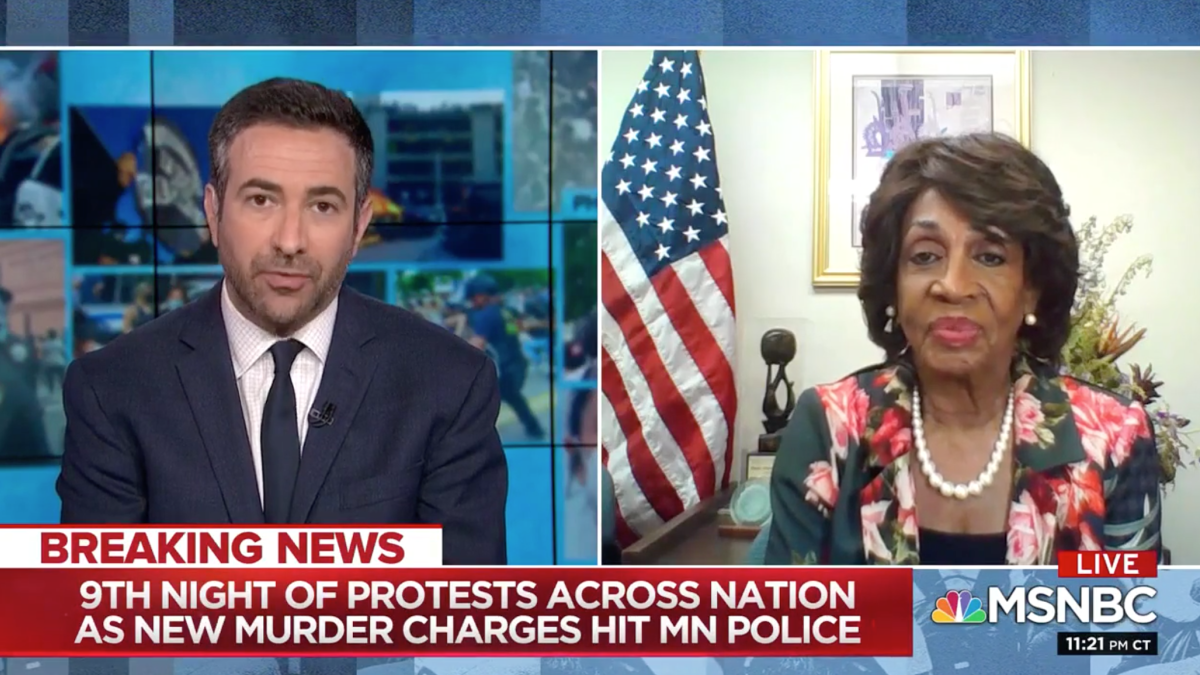ICYMI: Rep. Maxine Waters: ‘I Believe that these Young People in the Streets are Truly Creating Change’

LOS ANGELES – Congresswoman Maxine Waters (CA-43), Chair of the House Financial Services Committee, joined MSNBC's Ari Melber to discuss her history confronting police brutality, her support for the nationwide protests against the murder of Black men and women by the police, and Donald Trump's racist dog whistles and threats to use military force against protesters.
The interview can be viewed here.
A transcript of their conversation is below.
Ari Melber: "We're about to be joined by California Congresswoman Maxine Waters. She has been working on these issues facing the nation for a very long time. In 1992, she was in her very first term in Congress. We want to remind viewers of this. Parts of her own [Los Angeles] district saw the violence and unrest after many were shocked and outraged by the acquittal of officers in a beating caught on tape of Rodney King. The New York Times reported Waters presented herself at the door of President Bush after learning she was not invited to a meeting about those very issues…. Joining us now on this big night is democratic Congresswoman Maxine Waters, Chair of the Financial Services Committee. Congresswoman, as you look back then and look at yourself and the work you did then, what's on your mind in what has and hasn't happened since then?"
Rep. Waters: "Well, it has been many years since Rodney King, and before that I was confronting the then-Chief of Los Angeles police, Chief Daryl Gates, and not a lot has happened. Normally when an officer kills even an unarmed person, usually a Black man or a Black woman, it is deemed justifiable homicide. But I want to tell you, I have a very special feeling about what is going on now. I believe that these young people in the streets are truly creating change, and I think we're on our way to the development of laws and practices that we've not been able to achieve with all of the struggles that we've been in about law enforcement and the abuse and the targeting and the killing of Blacks in particular. And so, there are many -- while they're concerned about the protests I don't think people need to be concerned about the protests. People should be thankful because these young people are doing what legislation has not been able to accomplish, that the ministers begging and praying have not been able to achieve, and it goes on and on and on. So, because these young people [have] said ‘enough is enough,' and they have hit the streets, and they are staying on the streets, I think they have just opened up a new era in dealing with police abuse with the killing of Blacks, in particular. I'm feeling very, very good tonight."
Ari Melber: "It's striking, Congresswoman, to hear you put it that way given your track record. We wanted to play one other thing we dug up, because when you look at history or social change there's movement and some of the movement, in all honesty has been towards you, towards things you have said and others that back in the day was considered radical or extreme: calling out racism for what it is. Let's take a look at a moment…with Katie Couric in '92…. Why was it important to you then to name it, racism, bluntly and do we need to continue to do that now?"
Rep. Waters: "Well, you know, I have the ability to call it like I see it. That's unusual, particularly with elected officials. I also know that the right wing, the white supremacists, and the KKK had shut down using the word [racist] and claimed that those of us who would dare use the word were basically racist ourselves. And so, for a number of years, particularly elected officials were squeamish about using the word ‘racism.' I've never backed down from it. And I think now that the world really knows and understands what it is. And so, I'm pleased that we can openly talk about racism and get into a discussion about what it is and what it takes to get rid of it. And so yes, I used it back then. I've continued to use it.
"I've talked about the president. The president is a racist. As a matter of fact, I've known that the president is a dangerous human being, a would-be dictator who would move in the direction that he's doing. Many people were shocked when he came out and walked out to that church with the Bible in his hand, with the military backing him up, and having all of those protesters basically gassed. And in addition to that, [he] threatened [violence].
"I'm not shocked and I'm not surprised, because I warned America that [Trump] was a dangerous man, a would-be dictator. This was a man who has no conscience. This is a man that should never have been in the highest seat of the land. And so, I'm hopeful that the more he defines himself, and the more he's rolling out, threatening all of these young people -- it's not just Blacks that he's threatening now. He's threatening these young white children, young people whose parents perhaps are frightened that they're out on the street, probably don't want them there. And [these parents] must realize that if this president dares to pull the military out on them that their children are in danger, Black, white, green, whatever color. And so, while we are making movement here, I think we're on the verge of creating change."
# # #